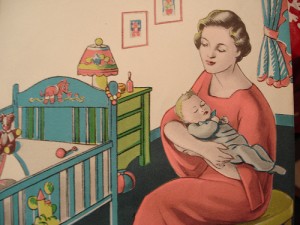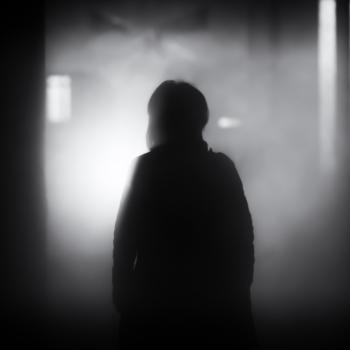 My mother used to sing us to sleep. Her lullabies weren’t choruses of “Twinkle, Twinkle Little Star” repeated just until she could tell we were out. No, she brought her guitar into the room my sister and I shared, sat close in the dark, and as far as we knew, had nowhere else to go and nothing more important to do. In those moments, she was all ours.
My mother used to sing us to sleep. Her lullabies weren’t choruses of “Twinkle, Twinkle Little Star” repeated just until she could tell we were out. No, she brought her guitar into the room my sister and I shared, sat close in the dark, and as far as we knew, had nowhere else to go and nothing more important to do. In those moments, she was all ours.
Our favorite songs were the sad ones. Like “Summertime,” that great ode to longing for what never was. We also loved “All the Pretty Horses,” and others I’ve struggled to remember. Even a nonsense song like “B-A-Bay” could sound melancholy in her lovely alto, sung at a volume meant to lull.
Her lullabies were a gift, one way that she could comfort us during a time when our father’s drinking and all that came with it caused so many things in our life to go wrong.
Later, home life improved. My mom remarried, and my sister and I got our own rooms. In adolescence, visits from Mom at night (or any time) were considered an invasion, not a comfort.
But I still needed lullabies, so I found new ones.
By day I was a normal teen, listening to Huey Lewis and the News and REO Speedwagon, and trying to learn to love Van Halen to gain acceptance from my peers.
By night, I may have been the only thirteen-year-old in town whose favorite radio station was KABL with its string arrangements and light classics. My continuing preference for sad songs made Gordon Lightfoot and Dan Fogelberg favorites.
In high school, my best friend Christine and I made mixed tapes we’d label simply as “sleep”—collections of quiet songs for bedtime listening. Lullabies. Those tapes included Everything But the Girl, Cyndi Lauper ballads, and Cat Stevens, who we’d discovered along with the movie Harold and Maude.
The perfect sleep mix kept a consistent level of mellow going for a full forty-five minute cassette side. The hope was to be asleep well before the sound of the play button popping back up could wake you.
Married life changed things, as it tends to. My husband’s childhood lullabies were the audio recordings he’d make of his favorite TV shows, and later, talk radio. This caused conflict until I got used to voices, too, and now we fall asleep to Coast to Coast AM or podcasts of various NPR shows.
My mother, after a decades-long gap between getting her masters degree in music and returning to it seriously, now writes her own songs and performs them at backyard concerts. She’s in the process of recording a studio album.
When she first embarked on her senior project as a singer-songwriter performing for others, my primary reaction was detached, theoretical pride. Good for her, I thought. She’s in her seventies and starting something really new. That’s cool.
But deep down, a part of me didn’t like it. And I didn’t like that I didn’t like it.
A couple of years ago at the Glen Workshop I watched her sing at open mike and found myself thinking, No. She’s mine. That part of her belongs to me, and my childhood, and my memory. I felt wretched and selfish, but also entitled to my resistance.
It wasn’t unlike how I felt when she started dating my stepfather. I was around eleven, and my dad had left. I believed that the three of us—my sister, my mom, and I—would finally be able to make life about taking care of ourselves, not my dad. Then it seemed she was gone again, into this new relationship.
And I guess seeing her move into a new relationship with her music triggered old abandonment fears.
Would my mother ever be mine? I’ve listened to her and watched her later-life vocation with these mixed feelings and thought, what do I want, anyway? Do I want a mother who lives vicariously through her grown kids? Who calls five days a week and puts us on guilt trips? No.
What I want I can’t have: My childhood back. Or a version of it that never existed.
And I think that’s what I wanted in the short time between fathers. To return to the bunk bed, my sister resting below me and the solace of our mother singing, only this time without the shadow of all that wasn’t right lurking just outside the door.
This past weekend I had my first chance to see Mom perform a full concert. I watched her friends gather in the shade of her hosts’ yard. We sat in folding chairs and drank glasses of iced tea. Horses nickered on the other side of the fence, gathering in to hear the music.
My mother sings from seventy years of lived life, lived faith. Some of the songs are fun, funny, and upbeat. Others are laments, and some tell stories from the Bible.
The confused desire to keep her and her voice to myself evaporated into the late afternoon. Throughout the concert, my reserved attitude was transformed into wonder, admiration, love.
That’s my mother.
She is mine. But not only mine.
As ever, I like the slow, melancholy songs best, especially “World, Goodnight,” the title track of her forthcoming album.
It’s about death and meeting God, a song addressing her Lord. It isn’t sad. Many people in the audience that day are probably in their final decade, and I listened as she sang to them—beautifully and beautiful—of her own longing, like mine, to return to something that hasn’t yet truly been.
A lullaby.
A gift.










